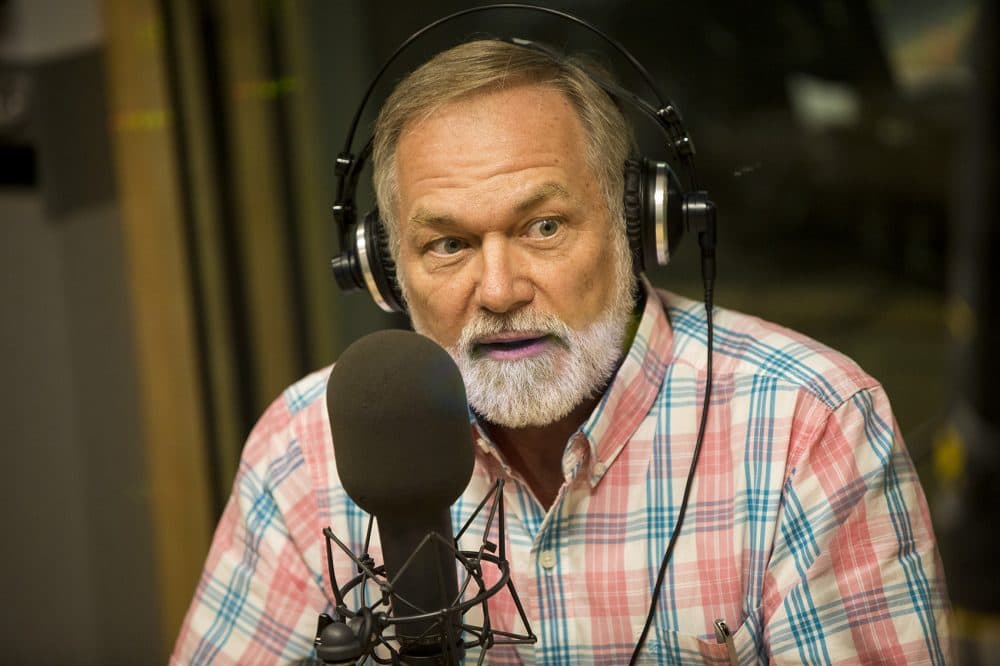Advertisement
Scott Lively On Why He's Running Against Gov. Charlie Baker
Resume
Scott Lively, Republican primary candidate for governor, joined Radio Boston in studio Tuesday for a special extended conversation. You can listen to it by hitting the play button atop this post.
The interview was part of our joint coverage of this political season, hosted by WBUR, the McCormack Graduate School of Policy and Global Studies at UMass Boston and the Boston Globe. (Here's our conversation with Gov. Charlie Baker.)
The interview highlights below have been lightly edited, for clarity.
Interview Highlights
On his support for President Trump
I think that he's a political genius. I think he's set a wonderful example in keeping his campaign promises. I think the policy positions that he holds for the most part, I'm strongly in agreement with, and I've promised that I will be the most pro-Trump governor in America if I get elected. And I'm not ashamed of that position. I don't waffle on that. And I think that would be the best thing that could happen here in Massachusetts.
On why he believes Beacon Hill is more corrupt than local governments
So much is being done on Beacon Hill, in fact, and a lot of the laws that are being imposed on us that people aren't even in the room when they're being passed. There are policies and procedures that are taking place on Beacon Hill that are just corrupt.
Like what?
Like getting a ... well let me come back at some point, and I'll outline those things for you. I'm not, I'm not prepared to sort of go into [them] when I make those allegations specifically. I want to be able to document those, but I'm just saying as a general rule that Beacon Hill is, it represents an elitist approach to making policy, very different from what the founders envisioned.
On his belief 'cynical politicians' use troubled citizens as 'cash cows'
The real problem that I see is that once again, cynical politicians who have control of the system are using addicts like cash cows. Every person that they can keep enslaved to methadone is an income stream to the state treasury and to, and to people that own drug labs, etc., etc.
This is how the system works, and that the federal treasury, all these federal tax money are sitting up there in a giant pool. And if you can qualify by having people that are homeless, that are drug addicts, that are, you know, mentally ill or whatever, any category that a person can be listed under, then opens the door for that person to receive federal money. There's money set aside for that. The more people, like one of my church members is, she's half-black, she's half-Native American and she used to work in state government here in Boston. She came and was involved in our church there in Springfield — she calls it a "catfish farm." And basically the idea is that they get all these people there who are government dependents all in the same place clustered together, and then all of that is about getting revenue from the federal treasury.
I feel like there's a theme in some of the things you've been saying. It seems to me as if you're saying that you see a conspiracy of Democrats and centrist Republicans in attempting to either through chemicals or government programs essentially enslave the citizens of Massachusetts so that they, the politicians, can get more money from the federal government?
Always follow the money. It's a basic rule of investigation. Follow the money, right? Why does Massachusetts have the type of problems that it has when solutions like Dr. Kishore's model are readily available and they could have been instituted the day after they took him down? Right? Why? Why does that not happen? Following the money trail, you know, sort of putting that conspiracy theory in place and looking at it [to] say, "Well, that's certainly plausible." Right? It's plausible that that's what's going on here, that they care more about the money than they do about the people. How come we've got families, we've got inner-city families that have been on welfare for three or four generations in Massachusetts? Why have we never found a way to be able to help those people become independent, self-sufficient? Right? And we know why. Because those people, because there's a system in which living off government largesse is rewarded, and the politicians that get voted back into office rely upon those constituencies at the election season.
This segment aired on July 17, 2018.

